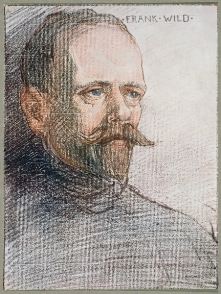Wild, Frank
People > Wild, Frank
 Frank
Wild, the eldest of thirteen children was born at Skelton, North Yorkshire on 10th April 1873, where his father Benjamin was the
village schoolmaster. After several moves around Yorkshire, Nottinghamshire and Lincolnshire the family arrived at Eversholt near Woburn
in January 1885 where Benjamin had been appointed the Headmaster of the local school.
Frank
Wild, the eldest of thirteen children was born at Skelton, North Yorkshire on 10th April 1873, where his father Benjamin was the
village schoolmaster. After several moves around Yorkshire, Nottinghamshire and Lincolnshire the family arrived at Eversholt near Woburn
in January 1885 where Benjamin had been appointed the Headmaster of the local school.
As a young man Frank had an inquisitive mind and was a member of the local church choir. He was offered a place at York Minister Choir School but sadly this coincided with the family move to Bedfordshire and he had to forgo the opportunity.
He is now acknowledged as the 'absolute giant of polar exploration' being the only person to go on every expedition that left Britain between 1900 and 1922. It would be utterly impossible to attempt to summarise the absolute magnitude of his contribution to polar exploration in just 700 words.
On leaving Eversholt School at the age of 15, Frank became a pupil teacher at nearby Woburn. He very soon decided that this was not for him and a year later joined the Merchant Navy sailing first on board the Sobraon from Plymouth to Melbourne. This was the beginning of eleven years hard sea training in all weathers and in all conditions something that would later stand him in good stead.
In October 1900 Wild joined the Royal Navy as an Able Seaman and this gave him the opportunity to apply to join Captain Scott's Discovery Expedition which sailed from the Isle of Wight in August 1901. It was to be three long years before Wild was to return home to Eversholt to the ecstatic cheers of welcome from family and the rest of the village.
He then joined Shackleton on the Nimrod expedition of 1907- 1909 and was a member of the team that crossed the Ross Barrier and Beardmore Glacier to reach the 'furthest point South'. Wild became Shackleton's closest friend and acknowledged right hand man and both expressed the wish that when the time came they should be buried together.
In 1911 he went with Douglas Mawson on his Aurora expedition and was put in charge of the western base on the Shackleton Ice Sheet. Having formed such a strong bond with Shackleton it was therefore almost inevitable that Wild would be invited to join the 1914-1916 Imperial Trans Antarctic expedition as Second In Command.
After the crushing and sinking of the Endurance, the entire crew found themselves stranded on floating ice for six months before they were able to land on desolate Elephant Island. Wild was then left with 21 men for a further six months living under two upturned lifeboats, and surviving only on seal meat, penguin and seaweed before Shacketon and a crew of 5 were successful in their epic rescue mission. Without exception all of the men credited their survival to the strength of character and inspiration of Wild.
Returning to the United Kingdom in 1916 he volunteered for war service with the Royal Navy and afterwards joined two former expedition colleagues in a farming venture in South Africa. One final trip to the Antarctic was to follow in 1922 when he was appointed Deputy to Shackleton in the Shackleton- Rowlett expedition which turned out to be poorly equipped, and underfunded and it was during this that Shackleton suffered his heart attack and died on South Georgia on 5th January 1922. Wild ensured that the expedition was completed and then returned to South Africa where he remained for the rest of his life, trying his hand at farming, gold prospecting and even mining. Having suffered long periods of ill health he died almost pennyless and little known at Klerksdorp on 19th August 1939 and was later cremated at Braamfontein Crematorium about a mile away. The funeral costs were covered by donations from friends and former employers.
Hardly a heroes end!
Despite his expressed wishes to be buried with Shackleton this did not happen and the ashes were actually lost for many years. It was only through the persistence of author Angie Butler that these were in fact found and were interred on the right hand side of Shackleton in his grave in South Georgia in 2011.
Further reading:
- Shackleton's Last Voyage by Frank Wild (1923)
- Frank Wild by Lief Mills (1999)
- The Quest For Frank Wild by Angie Butler (2011)
Frank Wild, by Trevor Stewart, 2015
Page last updated: 24th August 2015
